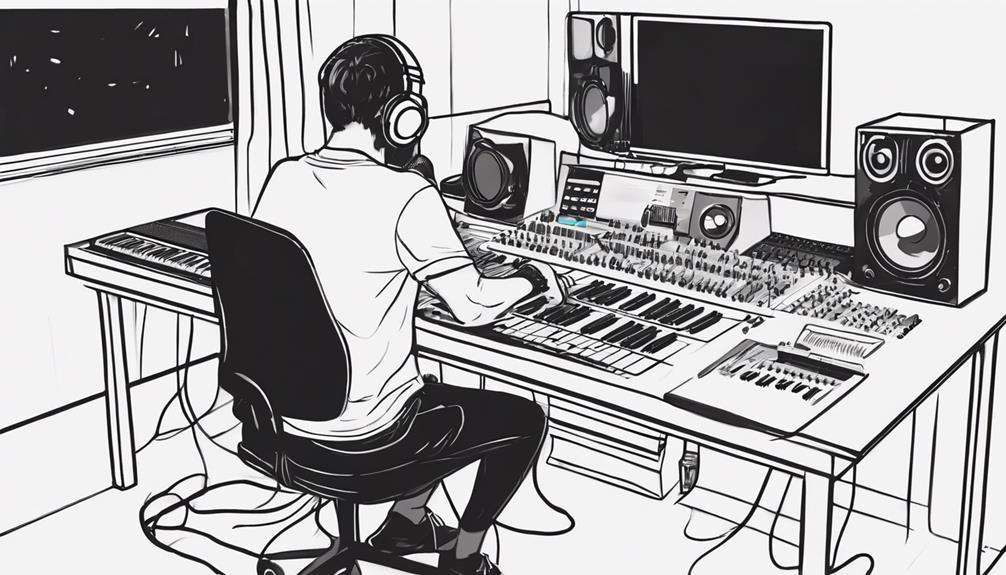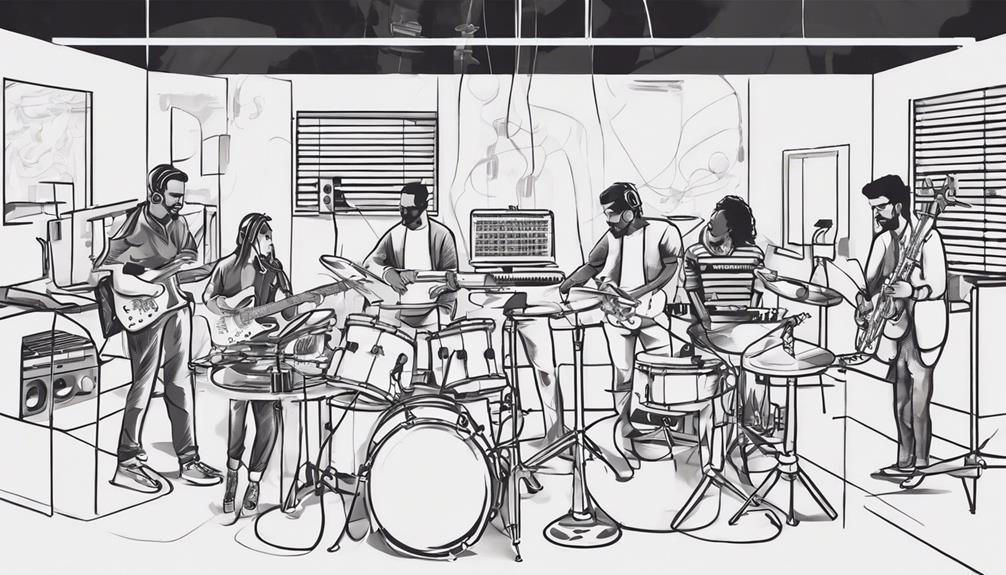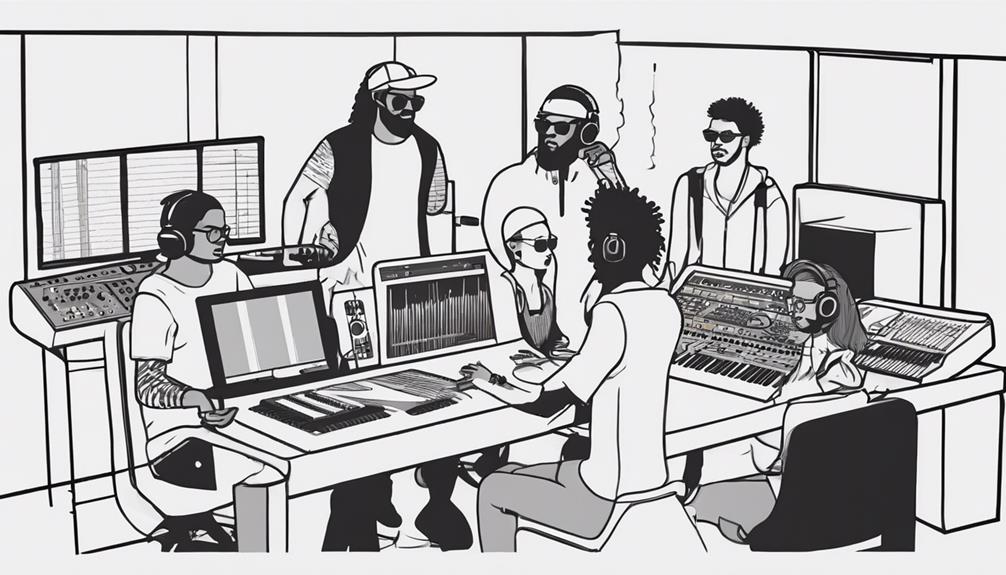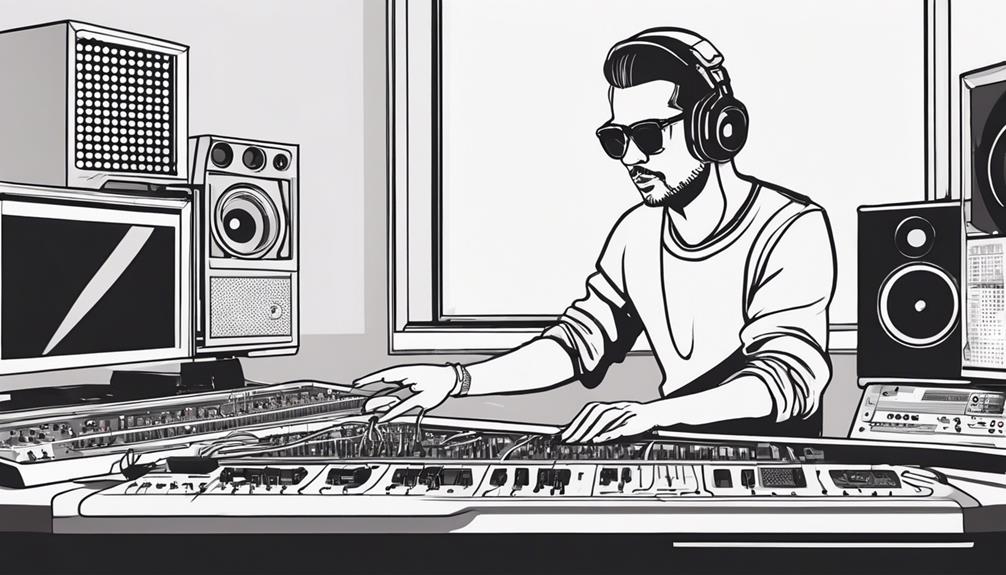To kickstart your music production company, pinpoint a niche aligned with your passion, like indie artists or film scoring. Identify target clients such as bands and agencies, tailoring marketing to their preferences. Stay organized with a clear file management system and backup solutions using cloud storage. Protect your business legally by drafting detailed contracts and seeking legal advice. Boost your online presence through engaging social media content and collaborate with artists to enhance creativity. Starting a music production company involves passion, niche selection, client targeting, organization, legal measures, marketing, and collaborations for success.
Key Takeaways
- Find a niche aligned with passion and skills.
- Identify target audiences like indie artists.
- Organize files systematically for efficient workflow.
- Utilize contracts for legal protection.
- Build an online presence through social media.
Finding Your Niche
To excel in the music production industry, you must pinpoint a specific genre or style that aligns with your skills and passion. Being passionate about music is the foundation for success in this field.
Consider delving into a specific niche market within the industry, such as catering to indie artists, specializing in film scoring, or creating commercial jingles. By focusing on a niche market, you can distinguish yourself from the competition and build a loyal client base.
Researching current music industry trends is essential when finding your niche. Understanding the demands and preferences of the market will help you identify opportunities for growth and innovation. By staying updated on industry trends, you can adapt your services and marketing strategies to meet the evolving needs of your target audience.
Finding your niche in the music production industry isn't just about selecting a specialty; it's about carving out a unique space for yourself based on your passion, expertise, and the current demands of the market.
Identifying Target Audiences

Identifying the specific demographics and preferences of potential clients is vital when it comes to pinpointing your target audiences in the music production industry. Aspiring music producers often focus on a range of clients, including independent artists, bands, and advertising agencies.
Understanding the geographic locations of your target audience is essential in tailoring your marketing strategies effectively. Researching the music genres or styles that resonate with your target audience allows you to offer specialized services that cater to their preferences.
It's important to explore the needs and expectations of your target audience to provide customized production solutions that meet their requirements. By utilizing market research and analytics, you can refine your target audience selection and maximize your outreach efforts to attract and retain clients effectively in the competitive music production market.
Organizing File Management
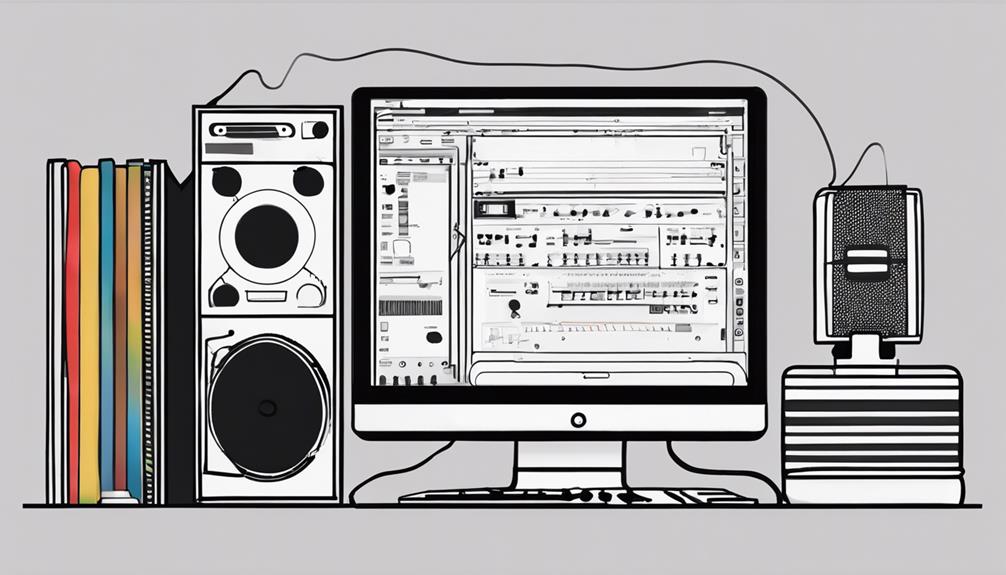
When organizing your music production company's files, make sure you establish a clear folder structure and backup solutions.
By naming files consistently and structuring folders logically, you'll streamline your workflow and find files effortlessly.
Implementing backup systems will safeguard against data loss and maintain project continuity.
Folder Structure
Establish a well-structured folder system on your computer to effectively manage and organize your music production files.
When setting up your folder structure for music production, create main folders for different types of files like project files, audio samples, and final mixes. Use descriptive names for each folder and consider adding subfolders to further categorize your files. This organization will help you quickly locate and access specific files, enhancing your workflow efficiency.
To maintain consistency and avoid confusion, implement a naming convention for files within each folder. Additionally, keep client projects separate by creating individual folders. This not only helps with confidentiality but also prevents accidental mixing of files.
Backup Solutions
To guarantee the safety and accessibility of your music production files, consider implementing various backup solutions for organizing your file management. Utilize cloud storage services such as Dropbox or Google Drive for secure backup and easy access to your files from anywhere. Implement a detailed file naming system that includes the project name, date, and version to maintain organization and prevent confusion. Additionally, consider using external hard drives or NAS devices for extra storage and redundancy. Regularly backing up your project files is crucial to avoid data loss in case of hardware failure or accidental deletion. Investing in backup automation tools can streamline the backup process, ensuring the protection of your valuable music production files.
| Backup Solutions | Description | Benefits |
|---|---|---|
| Cloud Storage | Utilize services like Dropbox or Google Drive for secure backup and accessibility to files. | Easy access, secure backup |
| File Naming System | Implement a system including project name, date, and version to maintain organization and avoid confusion. | Organization, clarity |
| Backup Automation | Invest in software tools to automate the backup process, ensuring data protection and streamlined workflow. | Efficiency, data protection |
Utilizing Contracts
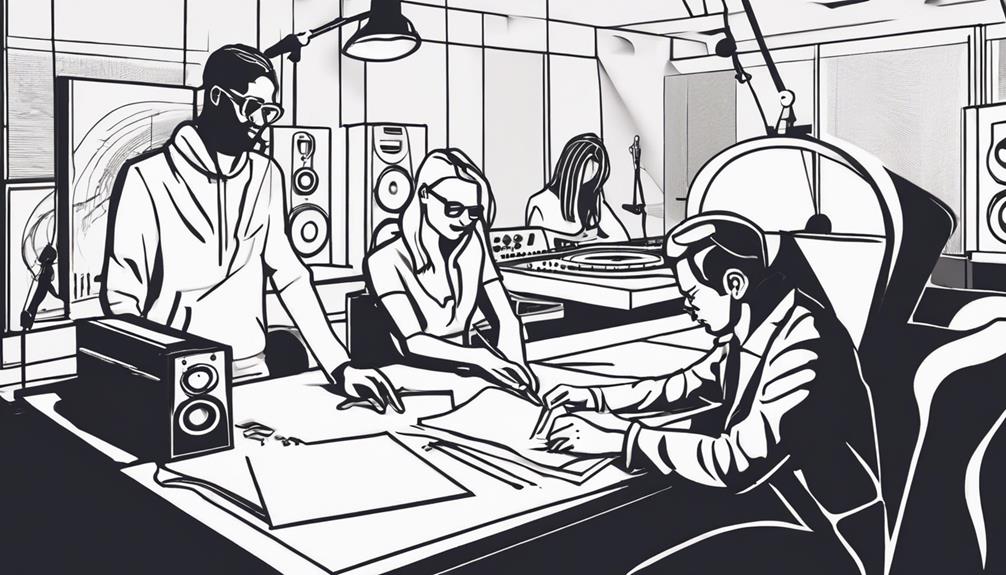
When starting your music production company, understanding contract essentials, legal protection tips, and key terms breakdown is essential.
Clear contracts outlining project scope, payment terms, and deliverables are key to avoiding misunderstandings and disputes.
Remember to specify ownership rights, revisions, and deadlines to protect both yourself and your clients.
Contract Essentials
Contracts play an essential role in the music production industry, outlining project details and protecting both parties involved. When drafting contracts for your music production company, make sure they clearly define the project scope, ownership rights, timelines, payment terms, roles, responsibilities, and deliverables.
By including these key elements, you establish boundaries, expectations, and legal obligations for all parties. Additionally, incorporating clauses for confidentiality, dispute resolution, and termination can provide added protection in case of unforeseen circumstances.
Legal Protection Tips
Safeguard your music production company's legal protection by utilizing well-drafted contracts that cover all essential aspects of your projects. Contracts play an important role in outlining the scope of work, payment terms, and project deadlines, ensuring clarity and accountability.
It's essential to specify ownership rights for music productions within these contracts to protect intellectual property rights effectively. Additionally, including clauses for project revisions, cancellation policies, and dispute resolution mechanisms can help mitigate potential conflicts.
Establishing confidentiality agreements through contracts is also crucial to safeguard sensitive information shared during projects. To make sure your contracts are thorough and tailored to your company's specific needs, seeking legal advice is highly recommended.
Legal professionals can assist in drafting contracts that provide adequate protection and address potential legal issues that may arise in the music production industry.
Key Terms Breakdown
Guarantee thorough protection for your music production company by dissecting key terms in your contracts to clarify project expectations and responsibilities. Contracts in music production, such as agreements outlining services, payment terms, and ownership rights, play an essential role in protecting both parties involved.
When drafting contracts, consider key terms like the scope of work, deadlines, revisions, and confidentiality agreements to establish clarity on project deliverables and responsibilities. By incorporating these essential elements into your agreements, you establish a professional framework that helps prevent misunderstandings or disputes down the line.
Cultivating Social Media Presence
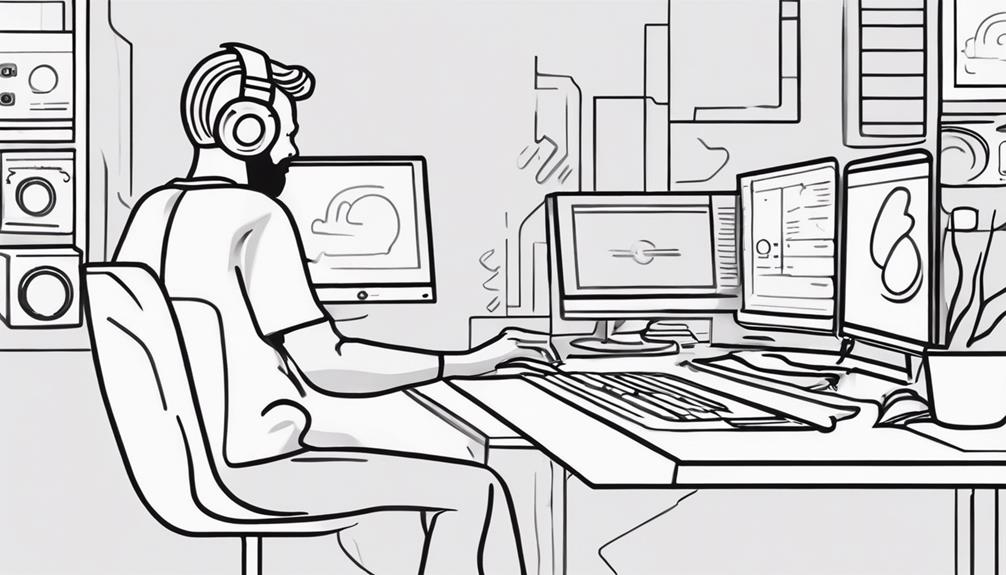
To cultivate a strong social media presence for your music production company, focus on utilizing platforms like Instagram, Facebook, and Twitter to showcase your work and connect with potential clients. Use these platforms to regularly post engaging content such as behind-the-scenes footage, music production tips, and client testimonials. By sharing valuable and interesting content, you can attract more followers and build a loyal audience.
Collaborating with other music producers, artists, and influencers can also help expand your reach and credibility on social media. Look for opportunities to work together on projects or cross-promote each other's work to reach a wider audience.
Additionally, consider using targeted advertising to reach specific demographics interested in music production services. This can help you attract potential clients who are more likely to engage with your content and ultimately, use your services.
Engage with your audience through polls, Q&A sessions, and live streams to build a strong community around your music production company. By interacting with your followers, you can create a loyal fan base that will support and promote your music production business.
Collaborating With Artists
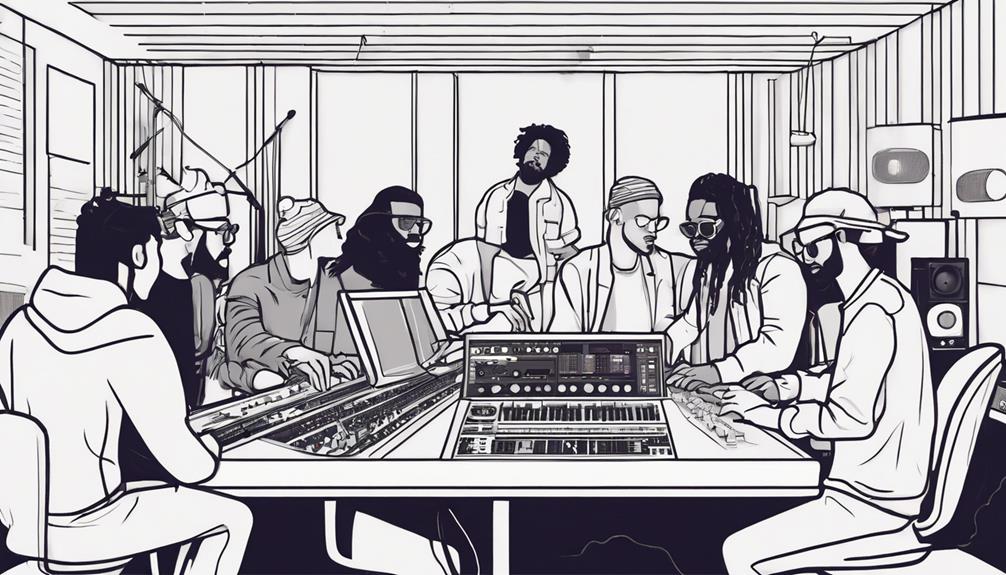
Engage in collaborative efforts with artists to enhance the creativity and diversity of your music production projects. By collaborating with artists, you can showcase your production skills while tapping into their unique talents and perspectives.
Building strong relationships with artists not only enriches the creative process but also establishes a network within the music industry that can lead to long-term partnerships.
Artists bring their own creativity and vision to the table, expanding your portfolio and bringing fresh ideas to your projects. Effective communication and a deep understanding of artists' preferences are essential for successful collaborations that align with their artistic goals.
Through collaborating with artists, you can open doors to new opportunities, increased exposure, and recognition for your music production company. Embrace the collaborative nature of the music industry, and watch as your projects flourish with diversity and innovation.
Frequently Asked Questions
How Do Beginners Start Producing Music?
Start producing music by learning music theory, sound design, and mixing online. Practice regularly, collaborate with artists, and network within the music community. Acquire essential equipment, like a computer and DAW software, to begin your music production journey. Explore different genres and study the elements that make each unique to find your creative niche. If you’re wondering how to start house music, focus on its signature four-on-the-floor beat, deep basslines, and soulful vocals to capture the essence of the genre. Experiment with layering sounds and creating grooves that resonate with listeners while honing your technical skills.
Do I Need an LLC as a Music Producer?
You're the maestro conducting the symphony of your music production career. To protect your harmony, an LLC offers a shield for personal assets and tax perks. It's a key to credibility and structure in this industry.
How Much Should I Charge as a Beginner Music Producer?
As a beginner music producer, charge competitive but fair rates based on your skill level, experience, and project scope. Consider industry standards, additional costs, and be open to negotiation with clients. Value your work while starting out.
How Much Does It Cost to Have a Music Production Company?
Starting a music production company can cost anywhere from $5,000 to $50,000 initially. Expenses include studio space, recording equipment, software, and more. Don't forget marketing, legal fees, insurance, and maintenance costs. Budget wisely to guarantee financial stability.
Conclusion
So there you have it – starting a music production company is an exciting journey that requires passion, organization, and dedication.
Did you know that the global music production market is projected to reach $2.1 billion by 2027?
With the right strategies and hard work, you can carve out your own space in this thriving industry.
Good luck on your music production company venture!

